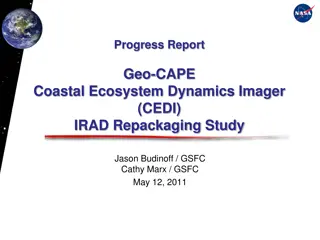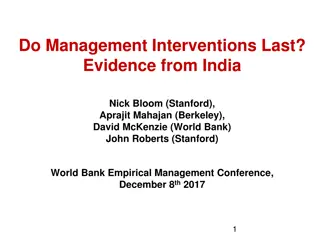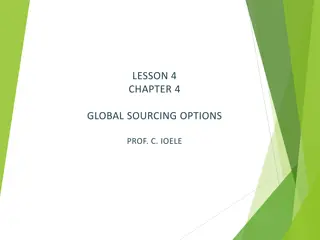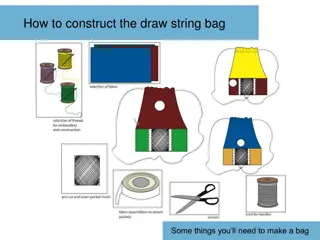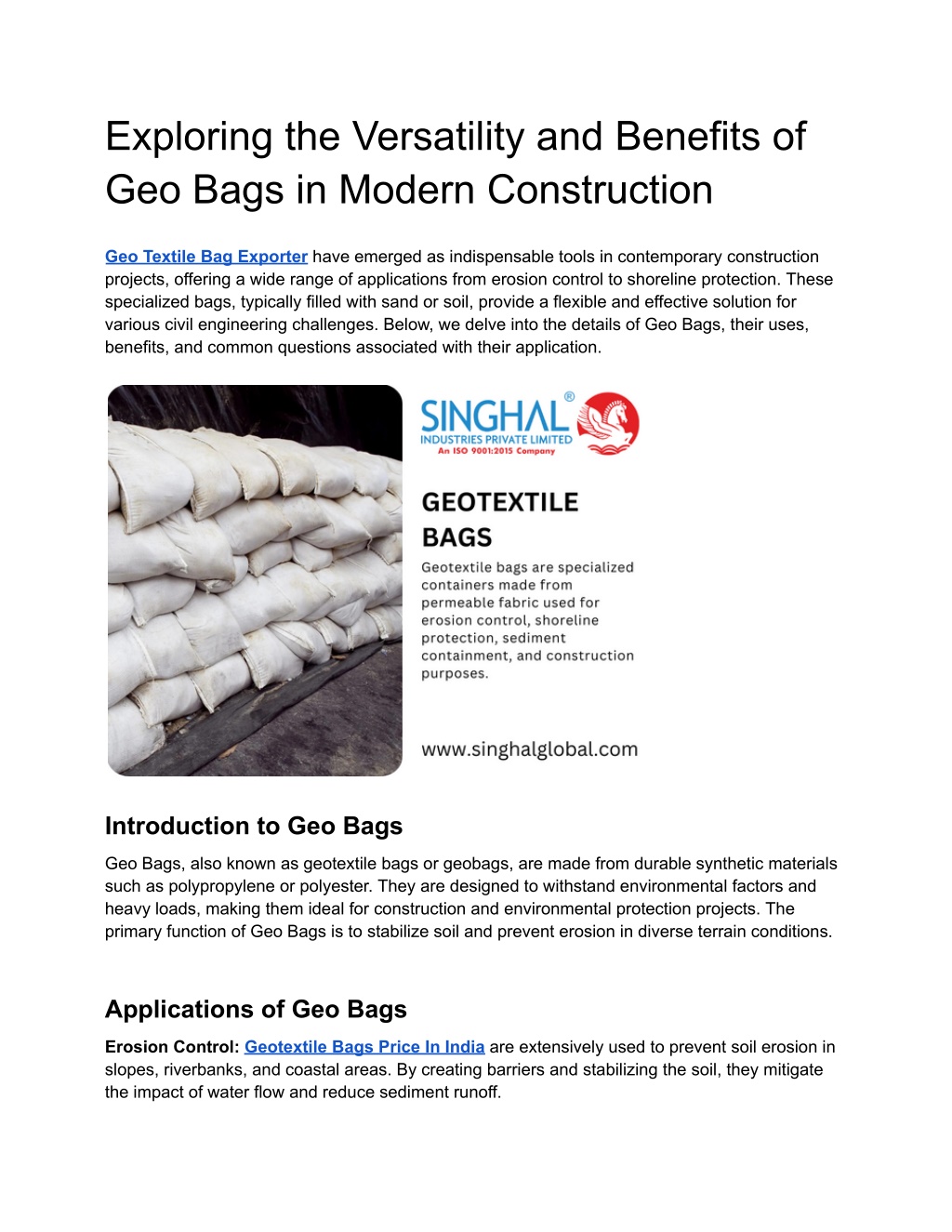
Leading Geo Textile Bag Exporter for Your Global Needs
As a prominent Geo Textile Bag exporter, we specialize in delivering high-quality solutions tailored to global infrastructure projects. Our bags are crafted with precision using advanced materials, ensuring durability and reliability in diverse envir
Download Presentation

Please find below an Image/Link to download the presentation.
The content on the website is provided AS IS for your information and personal use only. It may not be sold, licensed, or shared on other websites without obtaining consent from the author. Download presentation by click this link. If you encounter any issues during the download, it is possible that the publisher has removed the file from their server.
E N D
Presentation Transcript
Exploring the Versatility and Benefits of Geo Bags in Modern Construction Geo Textile Bag Exporter have emerged as indispensable tools in contemporary construction projects, offering a wide range of applications from erosion control to shoreline protection. These specialized bags, typically filled with sand or soil, provide a flexible and effective solution for various civil engineering challenges. Below, we delve into the details of Geo Bags, their uses, benefits, and common questions associated with their application. Introduction to Geo Bags Geo Bags, also known as geotextile bags or geobags, are made from durable synthetic materials such as polypropylene or polyester. They are designed to withstand environmental factors and heavy loads, making them ideal for construction and environmental protection projects. The primary function of Geo Bags is to stabilize soil and prevent erosion in diverse terrain conditions. Applications of Geo Bags Erosion Control: Geotextile Bags Price In India are extensively used to prevent soil erosion in slopes, riverbanks, and coastal areas. By creating barriers and stabilizing the soil, they mitigate the impact of water flow and reduce sediment runoff.
Retaining Walls: In construction, Geo Bags are employed as components of retaining walls. Their flexibility allows them to conform to the shape of the terrain while providing structural support against soil pressure. Land Reclamation: Geo Bags are instrumental in reclaiming land from bodies of water or marshy areas. They facilitate the gradual buildup of soil by containing dredged materials or natural sediments. Protection of Pipelines and Utilities: These bags serve as protective barriers around pipelines and utilities exposed to soil movement and environmental factors. They prevent damage and ensure the longevity of infrastructure. Flood Protection: During flood events, Geo Bags act as temporary barriers to divert floodwaters or protect vulnerable areas from inundation. Their quick deployment and effectiveness make them essential in emergency response scenarios. Benefits of Geo Bags Versatility: Geo Textile Bags Price can be customized in size and shape to suit specific project requirements, offering flexibility in design and application. Durability: Constructed from high-strength materials, Geo Bags are resistant to UV radiation, chemicals, and biological degradation, ensuring long-term performance in harsh environments. Cost-Effective: Compared to traditional construction methods, Geo Bags are often more economical due to reduced labor costs and simpler installation procedures. Environmental Compatibility: They promote environmental sustainability by minimizing soil disturbance and supporting natural vegetation growth. Conclusion Geo Bags represent a modern solution to challenges in civil engineering and environmental protection. Their versatility, durability, and cost-effectiveness make them indispensable tools across various applications, from erosion control to infrastructure development. As construction methods evolve, Geo Bags continue to play a crucial role in enhancing project efficiency and sustainability. Frequently Asked Questions (FAQs) About Geo Bags Q1: How are Geo Bags filled? Geo Bags are typically filled on-site using locally available materials such as sand, gravel, or soil. The filling process is straightforward and can be adapted to suit project-specific requirements. Q2: What factors should be considered when selecting Geo Bags? When choosing Geo Bags, factors such as the site's environmental conditions, hydraulic requirements, and desired longevity should be evaluated. Consulting with a geotechnical engineer can provide valuable insights into selecting the appropriate type and size of Geo Bags.
Q3: How long do Geo Bags last? The lifespan of Geo Bags varies depending on factors such as exposure to sunlight, water conditions, and the quality of materials used. Proper maintenance and periodic inspections can extend their durability significantly. Q4: Can Geo Bags be reused or recycled? Yes, Geo Bags can often be reused in other projects after cleaning and inspection. Some materials used in Geo Bags are recyclable, contributing to sustainable waste management practices.








